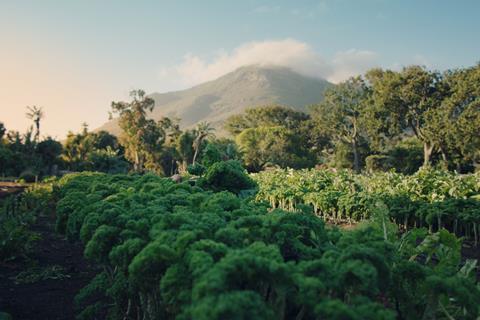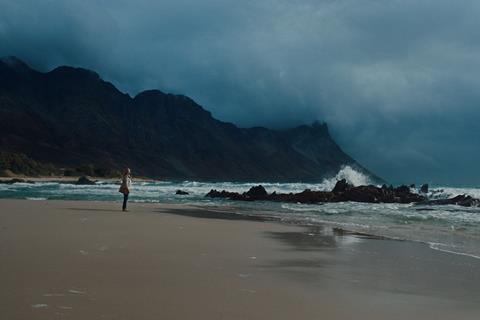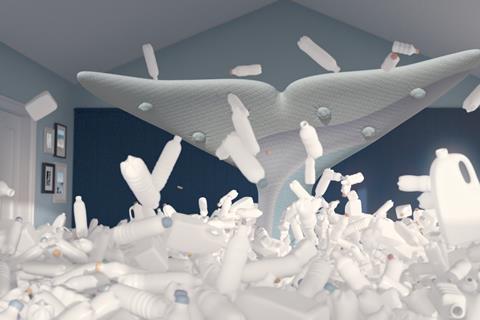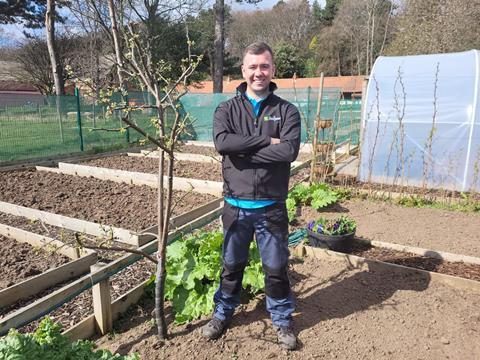With streaming platforms ever hungry for content, demand for TV and film production is set to increase at a phenomenal rate, but in the race to feed our binge-watching, we need to be aware of the impact this activity is having on the planet, writes Michael Burns.

Climate change driven by carbon dioxide release is having negative effects the world over, with melting sea ice, regular extreme weather events and global warming harming the oceans and other delicate ecosystems. In 2021, the concentration of CO2 in the Earth’s atmosphere will reach 417 parts per million – 50% higher than before the industrial revolution – while half of the increase in CO2 in the past 300 years has occurred since 1980.
But what has all this to do with media production? According to a report by Blackbird in collaboration with environmental management consultancy Green Element, our binge-watching and the content hunger it engenders is having deleterious effects.
- Read more:Themed week: Crafting content
The report ’Video shouldn’t cost the earth’ details the significant amount of emissions being created by TV and video production, which is set to increase as demand for content grows. Cited in the report is a calculation by Albert, the Bafta-backed environmental organisation, estimating that every hour of TV production generates 9.2 tonnes of CO2, and each tonne of CO2 results in the loss of 3sqm of sea ice.
Ian McDonough, CEO of Blackbird, says while reception to the report has been very positive, it has highlighted a facet of the industry that most people aren’t really conscious of. “With the media industry becoming very big, it has a responsible role to play in this,” he says. “They are the ones that get the message out to everybody. If they haven’t got their yard in order, they’re not leading by example and that’s a problem.”
The report shows some parts of the industry are shaping up to address its emissions problem: for example, Sky has committed to achieve net carbon zero in all of its TV production activity by 2030, while IMG has committed to become carbon neutral by 2030 through remote production, energy saving and offsetting.
“With the media industry becoming very big, it has a responsible role to play in this. They are the ones that get the message out to everybody,” Ian McDonough, Blackbird
The report also suggests how cloud-native technologies can reduce the carbon impact from video editing and post-production activity. For example, remote production is a greener alternative to transporting people and equipment up and down motorways, or further afield, but McDonough says even here efficiencies can be made.
“Rather than use heavily polluting on-premise kit, they’ll decide to remotely produce and not send people to Japan or Brazil,” he explains. “The point is they’ve just lifted and shifted what they had on premise straight into the cloud, meaning they’re still moving that high bitrate content around unnecessarily.”
Blackbird offers a completely browser-based workflow and a codec that allows use of high-quality proxy versions of content. “You have to move a certain amount of high bitrate content around to publish it in high-quality format, but you only need to do that once,” adds McDonough. “The traditional NLEs in the cloud move it every single time, uploading, downloading, every time somebody touches that content or needs sight of that content. That’s very carbon-inefficient.”

Helping hands
Productions aiming to reduce their carbon footprint will find a range of sources ready to help. Along with the Digital Production Partnership (DPP), Albert provides tools and training to help the industry move towards zero carbon. One such tool is a bespoke calculator to calculate the carbon footprint of production. Some platforms, such as BBC, ITV, Channel 4, UKTV, Sky, TG4 and Netflix, have made use of the calculator mandatory, but it’s not a legal requirement.
“The largest part of a footprint for scripted and fact ent is travel, followed by studio and production office,” says Genevieve Margrett, communications manager for Albert. “So making sure a building is running on 100% renewable energy – we have a creative energy scheme which companies can join – and reducing travel as much as possible are the main things we recommend to have a positive impact.”
“Making sure a building is running on 100% renewable energy and reducing travel as much as possible are the main things we recommend to have a positive impact,” Genevieve Margrett, Albert
Green scene
An environmentally responsible circular alternative to landfill for unwanted scenery, props and furniture is being offered by Reset Scenery, a non-profit organisation on the Albert suppliers list. It was founded in 2018 by professional scenic fabricators Matt Doolan and Simon Cook, who often felt like they were “building for the skip”.
The pair initially put together a forum where people could facilitate exchanges of unwanted resources, but found that production companies and freelancers didn’t have time to invest. “They were trapped in the cycle of production,” says Cook. “As soon as one production finished, they had to move on as quickly as possible to the next, just to remain commercially active. This didn’t lend itself to spending any time retaining resources or putting things in storage.”
Reset Scenery now assists companies in moving towards cleaner, greener productions in multiple ways: a warehouse of reclaimed scenic items available for sale or hire at prices cheaper than having them fabricated from scratch; expertly clearing up at the end of shoots and productions and ensuring that assets will be dismantled and/or repurposed responsibly; providing training; and offering a calculator to work out the carbon costs associated with scenery.
Cooks says the key aim is to get the most out of the assets before final recycling, and to avoid sourcing new material and incurring its attendant carbon impact. “We’re working with the international studios, right down to the local community drama groups. As well as the National Theatre Scotland and Scottish Opera, we’ve done some work with the BBC, Netflix, Ward Park Studios and individual production companies, such as Forest of Black.”
“There’s a lot of will at every level to instigate change, but it is coming from interested individuals, rather than top-down policy,” he observes.
“There’s a lot of will at every level to instigate change, but it is coming from interested individuals, rather than top-down policy,” Simon Cook, Reset Scenery

Fresh approach to editorial and post
It’s also important for productions to think about what’s happening on screen. “There’s little point in making a production in a sustainable manner if the activities displayed on screen are encouraging an unsustainable lifestyle – jet set travel, meaty menus, high carbon activities and so on,” says Margrett. “The power a production yields through its onscreen content is huge, so it needs to be part of the process. Natural History does a fantastic job, but all genres have a part to play.”
Margrett acknowledges how hard the post houses are working to make positive changes, highlighting the efforts of Envy, Splice, The Farm and Coffee & TV as examples.
“As most broadcasters and producers are increasingly looking to their supply chain for carbon neutral suppliers, Envy is working hard to reduce our carbon footprint,” says Natascha Cadle, creative director and co-founder of Envy. “Moving to a renewable energy supplier on top of green incentives we already had in place makes all the difference. We are hoping to achieve ‘Albert carbon neutral’ supplier status very soon.”
Coffee & TV is a Certified B Corporation that balances purpose and profit and a carbon neutral studio. “We have pledged to reach net zero by 2022 by setting ambitious but necessary reduction targets in line with the UN Paris Agreement,” says the studio’s sustainability manager Holly Arnold. “In order to ensure we reach our goals as a company and as individuals, we will track and measure our Scope-3 emissions. Since the start of Covid-19 our team has been working from home, but we now face the challenge, like many other companies, of educating our staff about the climate crisis and encouraging them to take action.”
Coffee & TV has partnered with organisations like Do Nation and Big Clean Switch to supply the resources to commit to these goals. “In addition, we have been using tools and training from Ad Green to create a Coffee & TV Production Policy which will be implemented and managed by Green Stewards from Green Screen to certify the sustainability of each shoot,” she adds. “The B impact assessment was crucial for us to understand our company’s impact on the world and in turn made us a better business for people and the planet. The team also supports the Ad Net Zero action plan in using the power of advertising to encourage consumer behavioural change for the better. We are determined to reach these reduction targets in line with the 1.5℃ pathway. In the meantime, we have offset our emissions so when our clients and partners collaborate with us, they are able to lower their carbon footprint by accounting for our carbon neutral studio in their value chain.”
Remote working
Some studios are playing their part too. Salford’s dock10 is exploring ways to help reduce its carbon footprint and increase sustainability for itself and the productions that use its facilities.“Looking at dock10’s facilities, it’s very easy to talk about sustainable production. This is clearly important for the environment, and it also gives us a competitive edge because sustainability really matters to our customers, producers and broadcasters,” says Andrew Culley, COO at dock10. “We want to ensure that our environmental credentials amount to more than just pledges and promises so we are proud to hold UKAS-accredited certifications including ISO 9001 (Quality Management), ISO 50001 (Energy Management), ISO 14001 (Environmental Management), and ISO 45001 (Health & Safety Management).
“Beyond this, our employees take sustainability very seriously and they are an important part of our efforts. We have set up an action group with representatives from each department who challenge and drive our environmental agenda for both the company and customers. This has included replacing all bins with recycling points, removing all single-use plastic bottled water from site and replacing it with mains-filtered water and reusable drinks bottles, as well as replacing paper cups with reusable cups made from coffee beans.”
The studio also began working on a remote gallery proposition for sports broadcasting in 2019. “With the global pandemic changing television production workflow and travel, our remote gallery became an essential solution for broadcasters and is now a new permanent way of working,” Culley says.
Not just for sport, dock 10’s remote gallery can be used for any outside broadcast, including concerts, major news events, festivals and so on.“Our remote production solution enables content to be edited anywhere,” Culley adds. “The content can be uploaded from a studio, film location or outside broadcast, and using our solution it can be edited wherever the production team wants to work. All of our studios have secure remote viewing so production can see what is happening on the studio floor or from the perspective of any individual camera.”
Hope for the future?
Margrett says the sustainable message is cutting through to action, “thanks to our training and the appetite of the industry to learn and change”. But there is still too much focus on the small things, she says. “Productions can think they are being sustainable by not using plastic bottles, when in reality that accounts for less than 1% of an overall footprint. It’s still a good move, but it’s not enough on its own.”
Cook feels that widespread change is going to require some form of high level regulation or legal imperative, similar in a way to the changes in health and safety we’ve seen, driven perhaps by groups like Albert and the Association of British Theatre Technicians (ABTT). “These industry representatives can bridge the gap between the passionate individuals and the people that can instigate regulatory requirements,” he says.
McDonough feels the sustainable element needs to be seen as just another part of the production workflow. “If it’s just part of the process, it will get done. [Otherwise] people are thinking far too much about getting the job done or making some money.”
“It’s the biggest crisis facing the world today, but we can do something about it,” he adds. “Therefore we should.”

Case Study
Tern TV: Green thinking in the garden
Beechgrove, produced by Zinc Media Group’s Tern Television for BBC Scotland, has been dispensing horticultural wisdom since 1978, but the production team don’t just have green fingers.
“Sustainability is in the subject matter but we have made it our mission to take that to a whole new level,” says series producer Gwyneth Hardy. “We have our Albert Sustainable Production badge and we are really proud of it.
“In order for sustainability to not be just a box-ticking exercise, we need to start from a different perspective. For example, because of COVID, all of us have worked remotely and that has allowed us to diversify our production team and our talent pool. We have developed a new strand where we are teaching six families to film themselves. Following the six ‘Beechgrowers’ through a growing season lets viewers see six gardens and gardeners from the length and breadth of Scotland without anyone having to travel.”
“We’re no longer sending large crews,” says Richard Collier, production manager for Beechgrove. “If a shoot is too far away, we’ll have the contributor self-shoot,” he says. “Due to Covid we’re opting for whatever personal transport the crew have available to them. We’re also selecting the closest crew we can, hiring them with kit or assigning them a kit to keep for the series, and delivering footage over file transfer to the edit, which is happening across Scotland.”
“Content-wise we are featuring as many sustainable gardening techniques and ideas as we can,” adds Hardy. “We have pioneered wildlife fauna and flora enhancing ‘no-mow’ lawns. Every week we have more recycling hints and tips, you never need to buy another plant pot again.”
Beechgrove is also cutting water usage through collected rainwater, it uses bamboo and plastic Keep Cups to cut down on single-use cups, composts its scripts and uses peat-free soil blockers to create plastic-free plant sowing stations.
The production also prioritises recycling when sourcing props. “Where it’s not possible to recycle, we aim for sustainable (peat free) and/or local suppliers,” says Collier. Even the onscreen talent are clothed responsibly. Calum Clunie’s jacket is made from entirely recycled plastic bottles,” says Collier. “His polos are made from organic/sustainably grown cotton.”
Case Study
Arrow: Shooting for a green target
“During production of Magic of Disney’s Animal Kingdom from National Geographic for Disney+, we used many cloud-based solutions that were key in helping to reduce our carbon footprint,” says Kyran Speirs, post production manager at Arrow. “Cloud-based viewing platforms like Limecraft have massively reduced the need to send drives out to productions wanting to watch or store archive and rushes. Using Azure as our cloud-based deep archiving platform for all media means no more LTO tapes, and we are using considerably less plastic in storing data. Being able to transfer vast amounts of data through the cloud obviously means not shipping drives daily via FedEx. It also gets into the edit quicker. We also use digital release forms like Adobe Sign or ShootCase when on set.”
Arrow has been using remote/cloud camera systems throughout the pandemic. “It certainly has its challenges, but we have discovered it has been incredibly green, flying fewer people around the planet, but still being able to enable UK crew and employment,” Speirs adds. “We have also enjoyed successful relationships with local crews where needed, so a healthy balance of both has encouraged a more positive contribution [to sustainability.



























2 Readers' comments